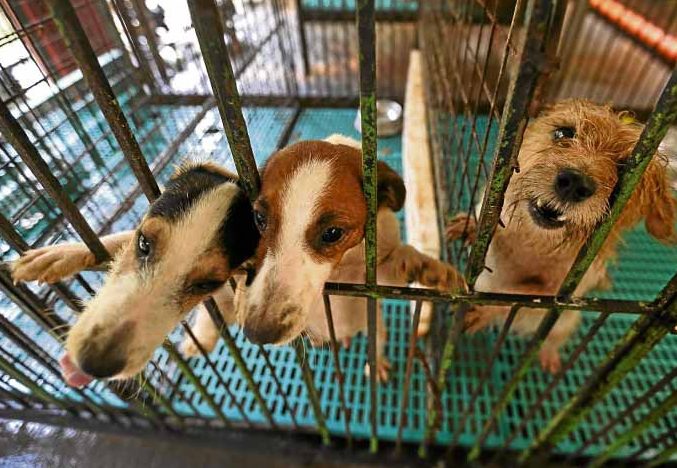Finding new, caring homes for PDEA’s pawed heroes

ADOPT US, PLEASE Mamoth (right), and two Jack Russell terrier pups greet possible
adopters with pleading eyes. —PHOTO BY LYN RILLON
Every dog has its day, and for some of the canines at the Philippine Drug Enforcement Agency’s (PDEA) K-9 Unit, those days may be over. They’re now ready for a less hectic pace.
On Friday last week, the PDEA K-9 unit offered 13 of its dogs for adoption, some of which were retired after eight years of service, while others had failed to make the cut as drug detection dogs.
“These dogs have greatly helped PDEA do its job. They are hailed as heroes after serving in the front line of the government’s fight against illegal drugs,” PDEA Director General Aaron Aquino said in a statement.
“PDEA has made them available for adoption because we want them to live in a stress-free environment with a loving family that can give them the care and attention they richly deserve,” he added.
Three hours into “Adoption Day” that started at 8 a.m., some 60 walk-in applicants from various provinces in Luzon showed up at the PDEA K-9 office in Sitio Lambakin, Barangay Sto. Cristo in San Jose del Monte City, Bulacan province, to try their luck.
Article continues after this advertisementHundreds of others, including foreigners, had already made inquiries by phone when PDEA posted the announcement on its Facebook page earlier this month.
Article continues after this advertisementOpen to public
For the first time, the adoption was opened to the public and a new procedure was put in place. Before, retired K-9s were simply kept in PDEA’s care till they reached old age.
Ready for a new life and new masters are nine Belgian Malinois—12-year-olds Jose and Silky, 10-year-old Snoopy, 5-year-olds Kery, Luz, Napoles, and Tina, and 4-year-olds Sky and Yomi.
Also up for adoption are two 5-year-old Jack Russel terriers King and Mamoth (which are offered as a couple); 5-year-old German Shepherd Ivy, and 5-year-old Icon, a Labrador golden retriever mixed breed.
Eight more dogs are actually on the adoption list, but they could not be released immediately since they would require some social “rehabilitation,” said PDEA K-9 Unit chief Bernardo Velasquez.
PDEA will be left with at least 50 dogs for its K-9 unit, which are deployed for field operations, high-security events and at airport or seaport checkpoints.
The agency plans to procure up to 100 more dogs in the last quarter of the year, Velasquez added.
Most of the K9s—even those that failed the six-month drug detection training—were procured by PDEA for around P425,000 each, while a few were donated.
Order of priority
Velasquez said that, given the huge government investment in acquiring the dogs, the agency had drawn up an order of priority for would-be adopters, with the original donors getting first dibs. Next in line are the dogs’ current handlers in K9 unit, employees from other PDEA units and then the general public
Despite being last on the priority list, walk-ins have a big chance of getting the dogs they like “as long as they qualify,” said PDEA spokesperson Derrick Carreon.
The agency is looking for adopters with the dogs’ welfare in mind, said Velasquez. Breeders need not apply: As per standard operating procedure, the dogs will be neutered before being turned over to their new families, the PDEA official stressed.
The prospective adopter’s financial capacity to keep the dog in a healthy, humane environment is also considered. “Will you be able to bond (with the animal)? Will it be able to socialize? Will it have a stress-free environment?” he added.
The applicants who came on Adoption Day were made to undergo a screening process that included being interviewed by the dogs’ veterinarians and handlers, and having an initial “socialization” time with their preferred dogs. Those who would qualify will get a call from PDEA within the week.
Well-behaved
The 13 dogs up for adoption were deemed “well-behaved” enough for the walk-in applicants. The others would require special care should they find new homes, among them Icon who sustained a leg fracture during training.
The older one will require medication and regular visits to the vet, as they have medical histories of heartworm, osteoarthritis, skin conditions, ear infection, liver problems or incontinence.
Eight dogs still need some “temperament modification,” like the Belgian Malinois named ARMM, which was supposed to be sent to the Autonomous Region in Muslim Mindanao but proved too “defensive” in the presence of strangers and big crowds.
“Whoever adopts him will need some expertise in handling dogs and must give him utmost attention,” said Ryan Plaza, ARMM’s handler, adding that PDEA would still be checking in on the animals’ condition in their new homes from time to time.